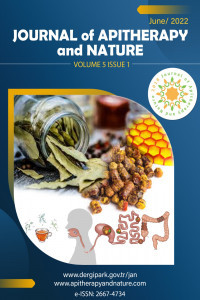Chemical Profiling of Tropical Propolis: Challenges and New Data
Chemical Profiling of Tropical Propolis: Challenges and New Data
beehive product, Chemical Profile, Propolis,
___
- .
- Yayın Aralığı: Yılda 2 Sayı
- Başlangıç: 2018
- Yayıncı: Oktay YILDIZ
New Antiproliferative Acyl Glycerols from New Zealand Propolis and Source Poplar Resin
Stephen BLOOR, Owen CATCHPOLE, Kevin MITCHELL, Rosemary WEBBY
Portuguese Propolis: A Potenial Source of Environmentally Friendly Fungicides
Catarina PASSÃO, Claudia RODRIGUES, Cristina Almeida AGUIAR, Ana CUNHA
Mihaela NICULAE, Laura STAN, Adriana URCAN, Timea DOMOKOS, Daniel S. DEZMIREAN, Otilia BOBIS
Yoga Bee, a New Approach for Health
M. B. GABRIEL, M. J. CARNEIRO, A. C. H. F. SAWAYA
Antimicrobial Effect of Commercial Propolis Extract (BEEO©)
Aslı Elif TANUGUR, Sevgi KOLAYLI, Merve KESKIN, Sengul ALPAY KARAOGLU
Isolated Xanthones from Lisotrigona furva Propolis in Vietnam
Le Nguyen THANH, Ha Thi THOA, Vu Thi Kim OANH, Diep Thi Lan PHUONG, Hoang Thi VAN, Nguyen Quynh CHI, Tran Huu GIAP, Nguyen Thi Tu OANH, Nguyen Thi Minh HANG, Nguyen Van HUNG, Chau Van MINH, Vassya BANKOVA
What We Know, and Don't Know, about the Benefits of Propolis to Honey Bee Health
Hristo PETKOV, Boryana TRUSHEVA, Milena POPOVA, Vassya BANKOVA
